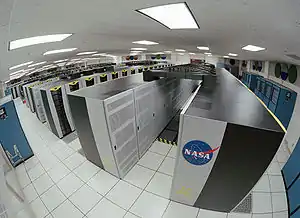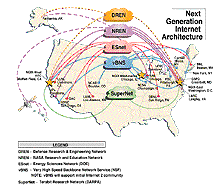NASA Research and Engineering Network
The NASA Research and Engineering Network (NREN) is a nationwide Wide Area Network which connects selected NASA centers and peers with other high-performance network test-beds. It enables NASA scientists, engineers, and researchers to reach their partners within other federal agencies and academia.

The NREN [1] was initially developed in 1996 enabling:
- Aerospace engineers to revolutionize air travel by remotely controlling wind tunnels on their desktops,
- astronauts and engineers to train together in realistic simulations of space flight,
- medical researchers to safely monitor and treat humans in space from the Earth,
- Earth scientists from all over the country to develop climate models that allow us to predict and respond to environmental events such as floods, and
- space scientists to chart the evolution of the universe.
NASA led the creation of the Next Generation Internet - as the lead organizer of the NGI Implementation Plan [2] NREN pioneered three initial NGI Exchanges (NGIXs) with its interagency partners.

Since its creation NREN has been upgraded several times. It currently has 10 Gigabits-per-second (Gbit/s) connectivity across the continental United States, primarily to link to the Columbia supercomputer at the NASA Ames Research Center in Moffett Field, California.[3]
In March 2006, NREN developed and implemented a custom wireless networking protocol known as Dynamic Source Routing (DSR). DSR was to be used by field teams and robots to facilitate communication in difficult field conditions.[4]
In September 2006 the NREN was used to develop a high transfer rate application called BBFTP to support GOES 5 operations between Ames and Goddard Space Flight Center (GSFC). BBFTP achieved transfer rates as high as 52 Megabytes/sec, and a net transfer of well over 4 terabytes worth of data.[4]
The NREN supported operations of the McGill High Arctic Research Station (MARS).[5]
References
![]() This article incorporates public domain material from the United States Government document: "the Research and Engineering Network of the National Aeronautics and Space Administration".
This article incorporates public domain material from the United States Government document: "the Research and Engineering Network of the National Aeronautics and Space Administration".